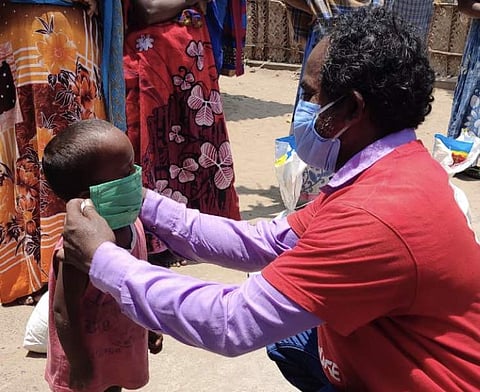

COVID-19 is no less than a disaster, killing many and bringing all economies to a standstill. So it made sense that Rapid Response, one of India's first disaster relief NGOs, stepped in to do their bit. They had started this good work one month back, spreading awareness about the virus via social media. But after the lockdown and news of stomachs going hungry started coming out, they decided to step into the field. Thus, they started operation in all the districts and states that they have a presence in like Karur in Tamil Nadu, Ernakulam in Kerala, Belgium in Karnataka, Kolhapur in Maharashtra and Chittoor in Andhra Pradesh.
"Though we have experience in dealing with disasters like the 2018 Kerala floods and more, what we are dealing with right now is a health hazard not restricted to any state or country," says Mohamad Farukh, Founder and CEO of Rapid Response when we ask him about how what they are dealing with right now is different from all that they have faced before. Thus, the plan is to distribute two kinds of kits, hygiene and dry ration supplies. While the hygiene kit, worth Rs 600, consists of handwash liquid, soap, Dettol, phenol, bleaching powder, masks, kerchiefs and awareness pamphlets, the dry ration kit, worth Rs 1,000, has supplies like rice, wheat, dal, cooking oil, sugar, salt and biscuit packets which will last a family of five for two weeks. Their grassroots work started about two and a half weeks ago. Farukh emphasises on the fact all the 40 volunteers who are helping distribute the kits are keeping social distance, are wearing masks and are ensuring that they do the best they can to help. "We work in tandem with the district administration and the district collector, who have given us the required permissions to carry out our distribution work in the communities," he informs us.
The livelihood project
We wonder how they are able to procure the masks as there is a shortfall of it and Farukh tells us that they have engaged women in different locations to stitch them. Their major stitching unit is located in Cuddalore, Tamil Nadu and there are other three subunits in the same district. There is also one small unit in every district they are present in. Totally, there are 60 women who have been trained as per the WHO guidelines of mask-making. Per day, each woman stitches 100 masks and they are able to make 6,000 masks in one day. "It is also a livelihood project for these tailors as their regular income has been hampered due to the lockdown," he shares.
So far, they have distributed 6,000 kits and their aim is to distribute 9,000 more. For this, they have launched a campaign on Ketto and it has crossed Rs 7 lakh and are close to their Rs 10 lakh mark. So, what's the next step? "Usually, once the disaster relief work is done, we move on to the next steps like recovery and reconstruction, but for this pandemic, we don't know for how long the lockdown will really go on for. So we need to wait and watch," says Farukh.
A brief flashback
It was after pursuing Postgraduation in International Development from the University of Manchester and working for seven years in Europe that Farukh came back to India to work here. In between, he also worked in the UK to gather funds for the tsunami that hit India. "I also volunteered for carrying out relief measures during the 2013 Uttarakhand Floods," he says. So what are the problems he is facing carrying out the current relief measures? "It is difficult to mobilise material and gather funds. Upon this, there are many people asking for different kinds of help and we are not able to help them all. What we are facing right now is truly unique," he shares and concludes.
